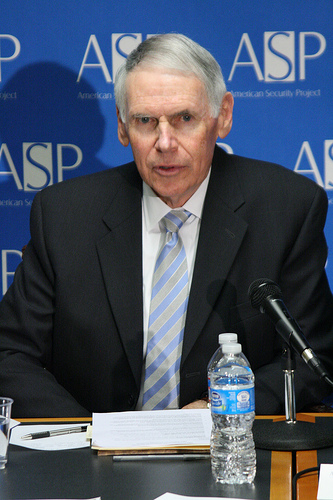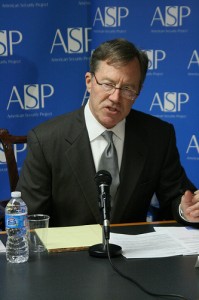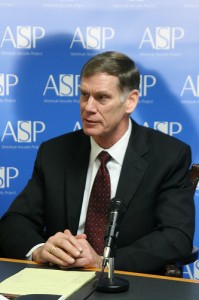
Iran Military Option – Event Review
Podcast: Play in new window | Download
Subscribe: Apple Podcasts | RSS
A panel of distinguished military leaders joined ASP for a discussion of the costs and consequences of military action against Iran. ASP CEO BGen. Stephen Cheney (USMC, ret.), Admiral William Fallon (USN, ret.), and LtGen. Frank Kearney (USA, ret.) explored the strategic and tactical aspects of the military option, the expected costs and effects of a strike, and the role of military versus diplomatic and economic efforts.
Click to watch the event video:
The panelists, all signers of the Iran Project report, “Weighing the Benefits and Costs of International Sanctions Against Iran,” noted that a clear understanding of the potential risks and results of the military option is key to making informed policy decisions.
BGen. Cheney and Adm. Fallon discussed the tactical aspects of a military strike, noting that the number, location, and fortifications of Iran’s nuclear facilities present a challenge for military planners.
“The bottom line is, it’s not going to be a one-time shot. It’s not going to be like ’81 or even 2007,” said Adm. Fallon, referring to previous attacks on nuclear facilities.
LtGen. Kearney emphasized the importance of clearly articulating the goal of a potential strike. “As a military leader, the first thing I ask policymakers is, ‘What is your objective?”’ he said.
LtGen. Kearney added that the military option, economic pressure, and diplomatic negotiations are all important elements of a balanced approach to the Iran nuclear challenge. The military option is important leverage in the nuclear negotiations, and therefore must remain on the table, he concluded.
Mutual mistrust between Iran and the U.S. is a major barrier to progress in nuclear negotiations, Adm. Fallon emphasized. The disconnect between Iranian rhetoric on its nuclear ambitions and ongoing enrichment activities, in excess of the amounts needed for civilian purposes, is puzzling for U.S. leaders. On the other side, Iran’s leadership views the U.S. objective as regime change, and is therefore suspicious of overtures.
“It comes back to trust,” Fallon said, adding “Tamping down the rhetoric is a good place to start [making progress on negotiations].”
Iran’s mistrust of U.S. motives could result in a m ilitary strike having some unintended consequences “You have to expect, as a military planner, one of their reactions could be that they’ll sprint towards nuclear weapon capability or increase rhetoric that they will,” LtGen. Kearney said.
ilitary strike having some unintended consequences “You have to expect, as a military planner, one of their reactions could be that they’ll sprint towards nuclear weapon capability or increase rhetoric that they will,” LtGen. Kearney said.
On the question of where the Iran crisis will go next, the panelists agreed that a solution is possible, but does not seem imminent. The situation is likely to get worse before it gets better, LtGen. Kearney said. Adm. Fallon agreed, noting that both sides need incentives to come to a deal. As Iran’s enrichment program progresses, the window for diplomacy grows narrow, and pressure will build for both sides to find a solution.
Click here for the audio of the event:
Check out our Flickr site for more images:






[…] Iran Military Option – Event Review […]
[…] recent event with retired military leaders on the costs and consequences of military action against Iran was covered by […]
[…] American Security Project hosted a panel of three esteemed former military officers to discuss military options against an Iranian nuclear program. ASP CEO BGen. Stephen Cheney (USMC, ret.), Admiral William […]